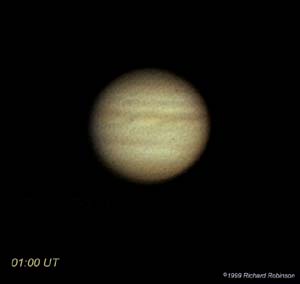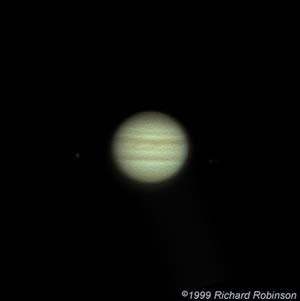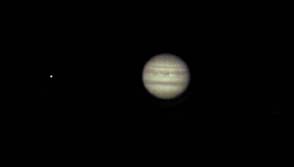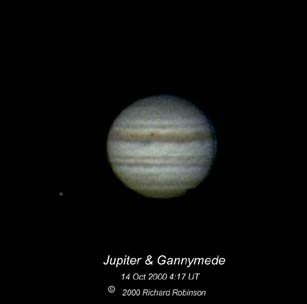 |
Scope:
8" LX 200 SCT
|
| MX-5C CDD | |
| This image was taken on 1 Jan 00 with a 3X barlow lens to provide a focal ratio of f30. Seeing conditions were not very good, but the image does shows streamer coming from the north equatorial belt. | Focal Ratio: f30 |
| Exposure: 0.75 sec | |
 |
Scope:
8" LX 200 SCT
|
| MX-5C CCD Camera | |
| Jupiter
Animation showing Io, GRS and Shadow rotate, taken 27-28 Nov 99.
Click here to download a list of all Jupiter Moon events for the year 2002 through 2004. The zipped file contains the data in a comma separated variable (CSV) format. |
Focal Ratio: f20 |
| Exposure: 23 frames @ 0.25 sec | |
 |
Scope: 8" LX 200 SCT |
| MX-5C CCD Camera | |
| Jupiter Animation showing Io emerging from Eclipse and the GRS taken 20 Nov 99. | Focal Ratio: f20 |
| Exposure: 22 frames @ 0.25 sec | |
 My second image of Jupiter of the year 2000. The first was taken on Jan 1 above. The seeing conditions were much better for this f30 image and it is one of my best. |
Scope: 8" LX 200 SCT |
| MX-5C CCD Camera | |
| Focal Ratio: f30 | |
| Exposure: 0.08 sec | |
 |
Scope: 8" LX 200 SCT |
| MX-5C CCD Camera | |
| Focal Ratio: f30 | |
| This is from the same image series as above, except it has different processing. Colors were synthesized in AstroArt and a maximum entropy deconvolution was performed on the luminance file in MaxImDL. The images were then combined and final color adjustments were made in Photoshop. I've posted both to show the effects of different processing and to keep from having to decide which I like best. | |
| Exposure: 0.08 sec | |
|
|